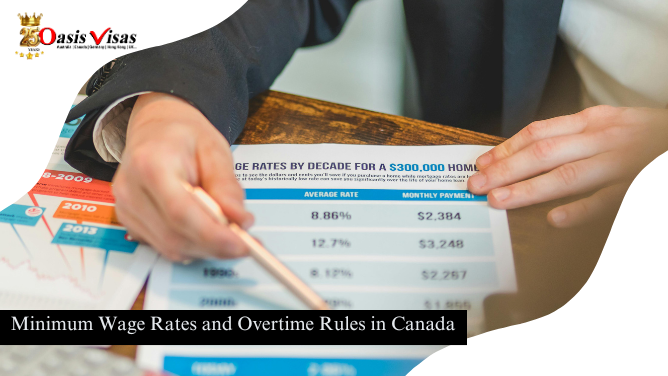
Canada is one of the countries that is famous for having good labor laws protecting employees. These laws include those dealing with minimum wage rates and overtime rules to provide employees with adequate compensation. Whether you are a full-time worker, part-time employee, or new in Canada, the understanding of such regulations will always be in your best interest. In fact, minimum wages for different provinces and territories differ within Canada.
More so, the overtime rule guarantees the right to overtime for a worker with just cause as stipulated. In this blog, we explore the current minimum wage rates in Canada, clarify overtime rules for workers and employers, and include some helpful hints to help work through these often-overlooked but very important aspects of employment law.
What Are Minimum Wage Rates?
Minimum wage rate are the lowest hourly pay that employers are legally required to provide their workers. The rates are determined by provincial and territorial governments and are updated periodically to reflect changes in the cost of living and economic conditions. In Canada, there is no national minimum wage rate; each province and territory determines its own. This way, minimum wages are reflective of the economic realities of specific regions.
For example, the minimum wage in British Columbia is $16.75 per hour as of 2024 and is among the highest in the country. Meanwhile, Newfoundland and Labrador set its minimum wage rate at $15.00 per hour. These differences show how minimum wage rates are localized within the country. Employees should know the minimum wage in their province because it will have a direct impact on their earnings and financial plans.
Overtime Rules in Canada
Overtime rules are as important as minimum wage rate in ensuring that workers are paid fairly. In Canada, most provinces and territories require employers to pay overtime when employees work more than a specified number of hours per week or day. The standard overtime pay rate is 1.5 times the regular hourly wage, often referred to as “time and a half.”
For instance, in the province of Ontario, overtime pay is guaranteed when there are more than 44 hours worked in a particular week. In Alberta, when overtime hours exceed more than 8 hours daily or more than 44 hours in a particular week. The law ensures that workers are paid for their excess working hours, reflecting respect for work-life balance and equity in Canadian workplaces.
Provincial Minimum Wage Differences
As discussed above, minimum wage rates vary in Canada. Let’s look at some of the provincial variations:
- Alberta: The minimum wage rate is $15.00 per hour.
- British Columbia: The highest in the country at $16.75 per hour.
- Ontario: The minimum wage rate is currently $16.55 per hour.
- Quebec: The minimum wage is set at $15.25 per hour.
- Manitoba: Minimum wage rate here is $15.30 per hour.
These rates are changed every year, and therefore, it is very important for both employees and employers to keep themselves updated. Many provinces change their minimum wage rates with respect to inflation, which keeps the purchasing power of workers intact even when the cost of living is increasing.
Why Minimum Wage Rates Matter
Minimum wages are, after all, not mere numbers. For most employees, they represent a more solid foundation of income security. Wages of young professionals, part-time employees, and entrance-level employees depend on minimum wages. By setting legal minimum wages, the government tries to reduce poverty, provide economic equality, and make sure that workers are treated appropriately.
Additionally, minimum wage rates impact the overall economy. When workers earn more, they have greater purchasing power, which boosts local businesses and contributes to economic growth. Employers also benefit from a more satisfied and productive workforce, as fair wages are a key factor in employee retention and morale.
Key Points About Overtime Rules
Understanding overtime rules is important for both workers and employers. Here are some key points to remember:
- Eligibility: Not all employees are eligible for overtime pay. For instance, managerial staff, independent contractors, and certain professionals may be exempt.
- Rate: Overtime pay is usually 1.5 times the regular wage, but some provinces may have variations.
- Hours: The threshold for overtime varies by province, so it’s important to check local regulations.
- Record-Keeping: Employers must maintain accurate records of employees’ hours to ensure compliance with overtime rules.
Challenges and Considerations
Although the law is clear, there are problems in implementing minimum wage rates and overtime rules. For instance, some workers in rural areas or those in agriculture will have different conditions where wage and overtime regulations apply differently.
Again, small businesses face a challenge in balancing the increase in wages with the costs of running their operations. All these call for effective communication and knowledge of employment laws.
Tips for Workers and Employers
To deal with the complexity of minimum wage rates and overtime rules, here are some practical tips:
- For Workers: Record your hours and make sure your wages are at the correct minimum wage levels and overtime wages. If you have any doubts or questions, you should feel free to call your employer or a labor union.
- For Employers: Stay abreast of recent changes in provincial wage laws and overtime rules. Review your payroll systems to be sure that they are current with the minimums and remain transparent with your employees.
Minimum wage and overtime rates are part of Canada’s labor legislation. It provides a safeguard for workers in ensuring fair pay and economic equity. If these regulations are known, the employee can guard their rights and employers can continue with compliance but build a friendly working environment. From minimum wage earners to those running payroll, awareness of these laws will be needed. Remember, the minimum wage is more than a legal rate, it’s the commitment of the country towards equality and economic fairness for every citizen of Canada.








